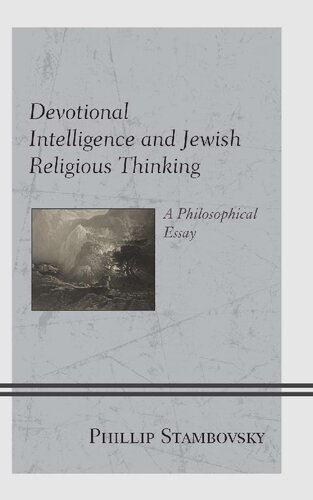

Most ebook files are in PDF format, so you can easily read them using various software such as Foxit Reader or directly on the Google Chrome browser.
Some ebook files are released by publishers in other formats such as .awz, .mobi, .epub, .fb2, etc. You may need to install specific software to read these formats on mobile/PC, such as Calibre.
Please read the tutorial at this link: https://ebookbell.com/faq
We offer FREE conversion to the popular formats you request; however, this may take some time. Therefore, right after payment, please email us, and we will try to provide the service as quickly as possible.
For some exceptional file formats or broken links (if any), please refrain from opening any disputes. Instead, email us first, and we will try to assist within a maximum of 6 hours.
EbookBell Team

4.1
50 reviewsThis groundbreaking neo-Maimonidean work establishes, on independently philosophical grounds, the intellectual warrant of Jewish religious thinking as “devotional intelligence.” It demonstrates the purchase and intellectual authority of such thinking by appeal to two dialectically interrelated principles: on the one hand, the metaphysical principle thatknowing is of being; and, on the other, “sacral attunement,” anormativeprinciple.
Part I distinguishes this study from leading work in contemporary philosophy of Judaism. It introduces the game-changing bid to privilege “intelligence” in theonto-epistemological Aristotelian sense, over epistemologically orchestrated, post-Enlightenment “reason” when it comes to assessing the intellectual soundness of religious thinking.
Part II distills contemporary elements of Aristotle’s onto-epistemological psychology of intelligence that Maimonides incorporated in his philosophy of Jewish religious thinking. Further, it finds inHegela bridge between Maimonides’ account of devotional intelligence and amodernMaimonidean “science of knowing” dedicated to religious thinking.
Part III turns to “sacral attunement,” foregrounding the normative “devotional” aspect of devotional intelligence. It probes the intentionality of both onto-epistemologicalattunementand the “sacred” relative to “the factor of the transcendent.” In the process it identifies and applies elements of an existential phenomenology of “fundamental attunement” that thematize defining realities of the sacral attunement unique to normative Jewish covenantal praxis. A related analysis of “the sacred” in religious thinking follows, which segues to a chapter on the “factor of the transcendent” as a seminal constituent ofmeaningin both the sciences and religion.
Part IV applies and amplifies key findings in light of a signature Jewish devotional theme: thedivine names, approached from a signally Maimonidean,apophaticposition indexed to the factor of the transcendent as the “unconditioned condition” (Kant) of intelligible meaning as such. Distinguishing what the divine namesindicatefrom what theyreferto, the essay concludes by substantiating the intellectual warrant of Jewish religious thinking as a devotional intelligence of the relation—of identity-in-difference—between the attributive names and the Tetragrammaton.